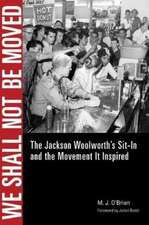A Hard Rain Fell: Sds and Why It Failed
Autor David Barberen Limba Engleză Paperback – 31 mai 2010
Preț: 276.94 lei
Nou
Puncte Express: 415
Preț estimativ în valută:
52.99€ • 55.48$ • 43.85£
52.99€ • 55.48$ • 43.85£
Carte tipărită la comandă
Livrare economică 07-21 aprilie
Preluare comenzi: 021 569.72.76
Specificații
ISBN-13: 9781604738551
ISBN-10: 1604738553
Pagini: 300
Dimensiuni: 152 x 229 x 17 mm
Greutate: 0.44 kg
Editura: University Press of Mississippi
ISBN-10: 1604738553
Pagini: 300
Dimensiuni: 152 x 229 x 17 mm
Greutate: 0.44 kg
Editura: University Press of Mississippi
Recenzii
With his book title David Barber makes clear for his readers what this text's purpose is: to explain the failure of Students for a Democratic Society (SDS). With forty years to reflect on the history of this organization, Barber has clearly identified the mistakes of the past: a failure on the part of young male activists to comprehend the concept of white skin privilege and a refusal to follow the advice of African American activists, especially those in the Student Nonviolent Coordinating Committee (SNCC) and the Black Panther Party (BPP), who urged them to go back to their white communities and combat racism there. They also failed to acknowledge the intellectual leadership role that blacks had played in the past (W. E. B. Du Bois and Malcolm X) and should rightfully assume in the black liberation movement. Furthermore, men in SDS ignored the contributions of women in the face of a growing feminist movement, thereby driving out some of their most dedicated members. They also did not listen to Vietnam war protesters who urged them to build a broadly based antiwar constituency in the United States. Instead, many leaders in SDS succumbed to a macho, self-indulgent and, in the end, self-destructive vision of a revolutionary movement centered around white male leadership.
In order to make his argument, Barber presents an extremely detailed analysis of all the permutations of SDS: from its origins in the civil rights movement of the early 1960s, when it developed as an ally of urban poor people and an initial leader in the antiwar movement, to its fractious end with bombings and confusion in the late 1960s. Along the way he explains the break with the more conservative Progressive Labor Party (PL), as well as the differences among the Revolutionary Youth Movement I (the Weathermen) and Revolutionary Youth Movement II factions. He also provides a nuanced account of the origins of the women's liberation movement that breaks down the divisions between
In order to make his argument, Barber presents an extremely detailed analysis of all the permutations of SDS: from its origins in the civil rights movement of the early 1960s, when it developed as an ally of urban poor people and an initial leader in the antiwar movement, to its fractious end with bombings and confusion in the late 1960s. Along the way he explains the break with the more conservative Progressive Labor Party (PL), as well as the differences among the Revolutionary Youth Movement I (the Weathermen) and Revolutionary Youth Movement II factions. He also provides a nuanced account of the origins of the women's liberation movement that breaks down the divisions between
Notă biografică
David Barber is assistant professor of history at the University of Tennessee at Martin. His work has appeared in Journal of Social History, Left History, and Race Traitor.











